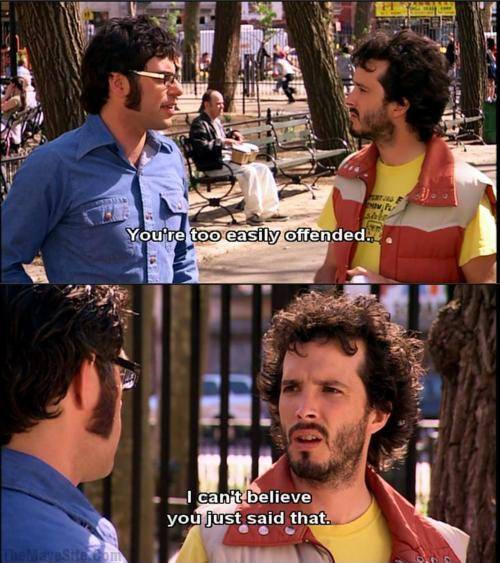Charity Project: Not Easily Provoked
Well, here is the first post of my Charity Project. I thought hard about what I should focus on for the coming week. At first, I considered writing about envy because of some lessons I felt I needed to learn at work. However, in the last few days, I've had the strong impression to write about being quick to react and take offense. In conjunction with our list in Moroni 7:45, I decided to study, and then live, the principle of being not easily provoked.
This week was a busy one for me. Our show had its first filming on Friday, and thus required a rigorous rehearsal schedule from us. Meanwhile, we still have a few empty spots to fill with sketches, so we're having to write in the middle of all these rehearsals as well. After a 12-hour dress rehearsal on Thursday, and an 11-hour rehearsal and then filming on Friday, we finally had a Saturday to ourselves. The day, however, turned out not to be to ourselves at all. Stephen and I attended a funeral of a very dear friend and on our way through the line to the viewing, encountered an excited teenager who screamed (in the church) "It's Stephen and Whitney from Studio C!" That about set the tone for the whole funeral. That evening, after being at home for ten minutes, we went to a birthday party, and from the birthday party, we went to see Stephen's brother and sister in-law before they flew home. Stephen is much better about these kinds of busy days than I am. From the start of that morning, I was flustered and tired and all I wanted to do was take a nap and not talk to people I didn't know (as I tend to be more of an introvert that way). By that night, I was exhausted for the third day in a row and a little frustrated that Stephen had made certain plans throughout the day without telling me that just extended my exhaustion. Didn't he know how tired I was? Shouldn't he be concerned about my discomfort? Of course, the day went exactly as it should have--we paid our respects to a friend who had passed away, we got to spend time with family, and we celebrated a birthday with friends--but for some reason, I was just a little Grumplestiltskin (which I imagine to look somewhat like this):
 To point us in another direction, there are also times when I feel very deservedly offended. There are times when Stephen makes a joke without thinking that hurts my feelings, or when someone in the writers' room is unintentionally harsher on my sketches than other people's writing, or when an overzealous teenager doesn't think to respect our friend we've come to say goodbye to when he screams out our names. These are probably the situations I should be focusing on, but, unfortunately, they don't happen as often. I think, for the most part, it is my mindset that is off-course rather than others' actions. As a Visiting Teaching message from the July 1988 Ensign states, “Most of us feel frustrated or impatient at times. But when we express those feelings by becoming angry with someone, we offend the Spirit and invite bitterness into our hearts. As we strive to come unto Christ and to perfect ourselves, we should ask ourselves not 'What is fair?' but, humbly, 'What would Jesus have me do?'”
To point us in another direction, there are also times when I feel very deservedly offended. There are times when Stephen makes a joke without thinking that hurts my feelings, or when someone in the writers' room is unintentionally harsher on my sketches than other people's writing, or when an overzealous teenager doesn't think to respect our friend we've come to say goodbye to when he screams out our names. These are probably the situations I should be focusing on, but, unfortunately, they don't happen as often. I think, for the most part, it is my mindset that is off-course rather than others' actions. As a Visiting Teaching message from the July 1988 Ensign states, “Most of us feel frustrated or impatient at times. But when we express those feelings by becoming angry with someone, we offend the Spirit and invite bitterness into our hearts. As we strive to come unto Christ and to perfect ourselves, we should ask ourselves not 'What is fair?' but, humbly, 'What would Jesus have me do?'”
 By the end of that long day, my frustration didn't make me feel good, even if at the time I felt like it was deserved. Deep down, I knew that nothing deserves a reaction that is un-Christlike. Being easily offended or provoked to anger never leaves you feeling good. Indignation, rarely leaves us feeling triumphant (unless we're someone like Noah or the apostle Stephen and are on an errand from God (: ). Maxwell puts it well when he says-- "Such is the scope of putting off the burdensome natural man who is naturally selfish. (See Mosiah 3:19.) So much of our fatigue, brothers and sisters, in fact, comes from carrying that needless load. This heaviness of the natural man prevents us from doing our Christian calisthenics; so we end up too swollen with selfishness to pass through the narrow needle’s eye" (Neal A. Maxwell). You know what he's talking about, right? The heaviness associated with alienating yourself through selfishness?
By the end of that long day, my frustration didn't make me feel good, even if at the time I felt like it was deserved. Deep down, I knew that nothing deserves a reaction that is un-Christlike. Being easily offended or provoked to anger never leaves you feeling good. Indignation, rarely leaves us feeling triumphant (unless we're someone like Noah or the apostle Stephen and are on an errand from God (: ). Maxwell puts it well when he says-- "Such is the scope of putting off the burdensome natural man who is naturally selfish. (See Mosiah 3:19.) So much of our fatigue, brothers and sisters, in fact, comes from carrying that needless load. This heaviness of the natural man prevents us from doing our Christian calisthenics; so we end up too swollen with selfishness to pass through the narrow needle’s eye" (Neal A. Maxwell). You know what he's talking about, right? The heaviness associated with alienating yourself through selfishness?
This is a seemingly obvious one, but it's imperative to becoming more Christ-like. Until we can be like God and think no evil thoughts ever at any second of forever, we need to control how we communicate with others. I promise you, 80% of the time when you feel the need to address someone who offended you, you really don't. Your pride may tell you that telling someone off is an important part of the process to fix the problem, but your pride is simply looking for justification to rear its ugly head. If you need to speak to someone, "[speak] the truth in love" (Eph. 4:15).
Elder Gordon T. Watts offers a few other remedies to being easily provoked. These will probably be my go-to list to consult whenever I feel irritation creeping up my chest, threatening to take control of the heart that should be used to love and uplift rather than to sulk and tear down.
- HUMOR

This week was a busy one for me. Our show had its first filming on Friday, and thus required a rigorous rehearsal schedule from us. Meanwhile, we still have a few empty spots to fill with sketches, so we're having to write in the middle of all these rehearsals as well. After a 12-hour dress rehearsal on Thursday, and an 11-hour rehearsal and then filming on Friday, we finally had a Saturday to ourselves. The day, however, turned out not to be to ourselves at all. Stephen and I attended a funeral of a very dear friend and on our way through the line to the viewing, encountered an excited teenager who screamed (in the church) "It's Stephen and Whitney from Studio C!" That about set the tone for the whole funeral. That evening, after being at home for ten minutes, we went to a birthday party, and from the birthday party, we went to see Stephen's brother and sister in-law before they flew home. Stephen is much better about these kinds of busy days than I am. From the start of that morning, I was flustered and tired and all I wanted to do was take a nap and not talk to people I didn't know (as I tend to be more of an introvert that way). By that night, I was exhausted for the third day in a row and a little frustrated that Stephen had made certain plans throughout the day without telling me that just extended my exhaustion. Didn't he know how tired I was? Shouldn't he be concerned about my discomfort? Of course, the day went exactly as it should have--we paid our respects to a friend who had passed away, we got to spend time with family, and we celebrated a birthday with friends--but for some reason, I was just a little Grumplestiltskin (which I imagine to look somewhat like this):
After a little while of tossing and turning in my bed that night, I was fed up with my behavior. Why was I so negatively affected by circumstances I couldn't control? Why did I have to get bitter and upset about things that were essentially good? Why did I have to take it out on Stephen for being more willing than me to be a good sport? After all, he had had the same schedule as me the past few days, but I didn't hear him complain.
I've noticed this tendency to become easily frustrated in other circumstances, too. I can become insecure when I feel like Stephen hasn't paid enough attention to me (let's blame that silly habit on birth control). I can become defensive when someone has something negative to say about my sketches. I can even get mad at the wind while walking home if it's continually blowing my hair in the wrong direction. Why is it so easy to let little things get the better of us?
 To point us in another direction, there are also times when I feel very deservedly offended. There are times when Stephen makes a joke without thinking that hurts my feelings, or when someone in the writers' room is unintentionally harsher on my sketches than other people's writing, or when an overzealous teenager doesn't think to respect our friend we've come to say goodbye to when he screams out our names. These are probably the situations I should be focusing on, but, unfortunately, they don't happen as often. I think, for the most part, it is my mindset that is off-course rather than others' actions. As a Visiting Teaching message from the July 1988 Ensign states, “Most of us feel frustrated or impatient at times. But when we express those feelings by becoming angry with someone, we offend the Spirit and invite bitterness into our hearts. As we strive to come unto Christ and to perfect ourselves, we should ask ourselves not 'What is fair?' but, humbly, 'What would Jesus have me do?'”
To point us in another direction, there are also times when I feel very deservedly offended. There are times when Stephen makes a joke without thinking that hurts my feelings, or when someone in the writers' room is unintentionally harsher on my sketches than other people's writing, or when an overzealous teenager doesn't think to respect our friend we've come to say goodbye to when he screams out our names. These are probably the situations I should be focusing on, but, unfortunately, they don't happen as often. I think, for the most part, it is my mindset that is off-course rather than others' actions. As a Visiting Teaching message from the July 1988 Ensign states, “Most of us feel frustrated or impatient at times. But when we express those feelings by becoming angry with someone, we offend the Spirit and invite bitterness into our hearts. As we strive to come unto Christ and to perfect ourselves, we should ask ourselves not 'What is fair?' but, humbly, 'What would Jesus have me do?'”
This question quickly shifts my feelings of hurt to feelings of humility. Regardless of whether or not we are right (which, generally, I am not) that is not the point. The point is to cultivate the spirit of Christ wherever we are. This is how we love. This is how we grow and progress.
REASONS FOR BEING EASILY PROVOKED
I think the main reason we are so easily offended or angered or annoyed by things outside of our control is just plain selfishness. We can be so preoccupied with our own needs/wants that we do not make room for others. We possess a myopic view of our circumstances and cannot see the big picture, which always requires us to look outside ourselves. We are not flexible enough to be instrumental to God in building up our brothers and sisters. Instead, we are self-consumed and quick to victimize ourselves and villainize those around us. As Neal A. Maxwell said in his talk, "Put Off the Natural Man, and Come Off Conquerer" “The selfish individual has a passion for the vertical pronoun I. Significantly, the vertical pronoun I has no knees to bend, while the first letter in the pronoun we does... Selfishness, in its preoccupation with self, withholds from others deserved, needed praise, causing a deprivation instead of giving a commendation.”
EFFECTS OF BEING EASILY PROVOKED
 By the end of that long day, my frustration didn't make me feel good, even if at the time I felt like it was deserved. Deep down, I knew that nothing deserves a reaction that is un-Christlike. Being easily offended or provoked to anger never leaves you feeling good. Indignation, rarely leaves us feeling triumphant (unless we're someone like Noah or the apostle Stephen and are on an errand from God (: ). Maxwell puts it well when he says-- "Such is the scope of putting off the burdensome natural man who is naturally selfish. (See Mosiah 3:19.) So much of our fatigue, brothers and sisters, in fact, comes from carrying that needless load. This heaviness of the natural man prevents us from doing our Christian calisthenics; so we end up too swollen with selfishness to pass through the narrow needle’s eye" (Neal A. Maxwell). You know what he's talking about, right? The heaviness associated with alienating yourself through selfishness?
By the end of that long day, my frustration didn't make me feel good, even if at the time I felt like it was deserved. Deep down, I knew that nothing deserves a reaction that is un-Christlike. Being easily offended or provoked to anger never leaves you feeling good. Indignation, rarely leaves us feeling triumphant (unless we're someone like Noah or the apostle Stephen and are on an errand from God (: ). Maxwell puts it well when he says-- "Such is the scope of putting off the burdensome natural man who is naturally selfish. (See Mosiah 3:19.) So much of our fatigue, brothers and sisters, in fact, comes from carrying that needless load. This heaviness of the natural man prevents us from doing our Christian calisthenics; so we end up too swollen with selfishness to pass through the narrow needle’s eye" (Neal A. Maxwell). You know what he's talking about, right? The heaviness associated with alienating yourself through selfishness?
He goes on to describe the process: “Each spasm of selfishness narrows the universe that much more by shutting down our awareness of others and by making us more and more alone. Sensations are then desperately sought precisely in order to verify that one really exists. A variation occurs when one is full of self-pity over affectional deprivation. He ends up in transgression” (Maxwell). Who wants that? Every time we choose to be angry or irritated, we are shutting ourselves off from an entire universe that is beautiful and bright and glorious!
Besides leaving us feeling burdened and tired and just plain gross, being easily provoked gets in the way of our developing of Christ-like characteristics. Maxwell continues that that mindset “stubbornly blocks the way for developing all of the divine qualities: love, mercy, patience, long-suffering, kindness, graciousness, goodness, and gentleness. Any tender sprouts from these virtues are sheared off by sharp selfishness… Thus, in all its various expressions, selfishness is really self-destruction in slow motion!” ( Neal A. Maxwell).
HOW TO FIX IT
- BITE YOUR TONGUE
This is a seemingly obvious one, but it's imperative to becoming more Christ-like. Until we can be like God and think no evil thoughts ever at any second of forever, we need to control how we communicate with others. I promise you, 80% of the time when you feel the need to address someone who offended you, you really don't. Your pride may tell you that telling someone off is an important part of the process to fix the problem, but your pride is simply looking for justification to rear its ugly head. If you need to speak to someone, "[speak] the truth in love" (Eph. 4:15).
Maxwell offers some advice on this subject, saying, “Whereas the natural man vents his anger, the men and women of Christ are ‘not easily provoked.’ (1 Cor. 13:5)… The meek men and women of Christ are quick to praise, but are also able to restrain themselves. They understand that on occasion the biting of the tongue can be as important as the gift of tongues.”
This may seem difficult, but something I always need to remind myself when faced with difficult expectations is that "The Lord did not send [us] here to fail" (Gordon B. Hinckley). And because we are meant to succeed, we need to use that motivation to help us rise above our circumstances. David A. Bednar comments on this ability to succeed in terms of agency:
In the grand division of all of God’s creations, there are things to act and things to be acted upon (see 2 Nephi 2:13–14). As sons and daughters of our Heavenly Father, we have been blessed with the gift of moral agency, the capacity for independent action and choice. Endowed with agency, you and I are agents, and we primarily are to act and not just be acted upon. To believe that someone or something can make us feel offended, angry, hurt, or bitter diminishes our moral agency and transforms us into objects to be acted upon. As agents, however, you and I have the power to act and to choose how we will respond to an offensive or hurtful situation. (David A. Bednar)Elray L. Christiansen also said, “Why is it inexcusable to explode with anger and become vindictive? Simply because the power has been given us to control and to overcome such tendencies” (Elray L. Christiansen). Woof! That puts you in your place, eh? The Lord has given us agency. He has given us the Holy Ghost and families and friends and prophets and mentors. He has given us resources that allow us to become better than we are. Thus, we have no excuse for acting less than we are.
Elder Gordon T. Watts offers a few other remedies to being easily provoked. These will probably be my go-to list to consult whenever I feel irritation creeping up my chest, threatening to take control of the heart that should be used to love and uplift rather than to sulk and tear down.
- HUMOR

“Anger can be kindled when one unkind remark is followed by a retaliatory response from another. If you find yourself in a tense situation, even if it appears a negative response is warranted, the use of humor where appropriate will often endear you to others” (Gordon T. Watts).
- INSPIRATION THROUGH PRAYER
“Prayer is a powerful weapon through which anger and contention can be “done away.” Blessed are those who, when stirred to anger, engage in silent prayer, thus making themselves more receptive to the guidance of the Spirit.”
- FOLLOW THE SAVIOR'S EXAMPLE
“We learn from the Savior that in our quest to be slow to anger, there are times when we must ‘hold our peace.’ We must be forgiving of others and harbor no malice or desire for revenge. And we must seek to love others unselfishly as the Lord loves us.”
“Jesus Christ is called the Prince of Peace (see Isa. 9:6), and his message is a message of peace to the individual and to the world. The gospel of Jesus Christ is the plan of life that will restore peace to the world, remove inner tensions and troubles, and bring happiness to the human soul. It is the greatest philosophy of life ever given to man” (Franklin D. Richards).
Take Home Message
Brothers and sisters, I know that this life can be frustrating. Whether it be because of our expectations of ourselves not being met or the expectations of others. When interacting with those around us, it is important to remember what Neal A. Maxwell said in his talk, "Meek and Lowly":
When people "leave their nets straightway" (see Matthew 4:20 and Mark 1:18), they come as they are—though in the initial process of changing, their luggage reflects their past. Hence, discipleship is a developmental journey that requires shared patience, understanding, and meekness on the part of all who join the caravan. Together we are disengaging from one world and preparing ourselves for another and far better world.I truly believe that this life is a state of learning. I am so often surprised at the distance I've still left to travel. I can get easily irritated with others, and then become easily irritated with myself. But I know that with a prayer in our hearts and a constant consciousness of Christ's example, we can slowly develop a patience for those who offend us, a love for those who hurt us, and when we're just being stupid brats, we can develop a hope for ourselves that God believes in our potential, and that is reason enough to never stop trying.




Comments
I find that many times, when I am angry, it is because I am experiencing frustrations built up due to unmet expectations (as Dr. John Lund often preaches). Just realizing that seems to help, because I can now focus on adjusting my expectations, and realizing that, given the circumstances, they may not really have been fair to begin with, either to myself, or to those around me. When I intentionally downgrade them, it seems much easier to also free myself of the anger I am feeling, and if nothing else, to quit stoking the fire of anger so that it burns out without hurting anyone, including myself.
I started putting my thoughts into a comment, but it took on a life of it's own. Rather than attempt to hijack someone else's blog (again) I turned it into a full-fledged post of my own.
http://orthodoxorchestration.blogspot.com/2013/07/is-charity-or-any-other-virtue-really.html
(The usual B.S. disclaimers apply - to click and read with caution...)